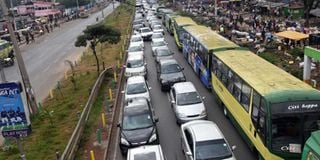Nairobians divided over Sonko's ban on matatus

Matatus and private cars stuck in a traffic jam along Nairobi's Jogoo Road. PHOTO | EVANS HABIL | NATION MEDIA GROUP
What you need to know:
- City Hall has banned matatus from Nairobi's CBD
- The ban takes effect from December 3
- The move is expected to reduce congestion in the city centre.
- Studies show Nairobi is among the most-congested cities in the world and number one in Africa.
News of City Hall’s planned banishing of matatus from Nairobi’s Central Business District from December 3 was met with mixed reactions, with Kenyans taking to Twitter to express support or voice their dissent.
Ibn Kidunduhu Babu @KidunduhuA said that the CBD ban on matatus will not solve Nairobi's traffic problems. He added that all big cities around the world have a light tram system and a policy of banning private cars from the CBDs.
NO SENSE
According to Jacqueline M Klopp @jmklopp1 the ban makes no sense. “Time for more thought out approaches to addressing congestion. Most cities are trying to ban cars not public transport,” she tweeted.
Richard R. Kisang' @RIchardKisang termed Sonko’s new law as a bad policy. “This is a bad policy and strategy to decongest CBD. I will not be surprised if this is challenged in court.”
But Mathenge Wahome @mathenge_wahome hailed the move by Governor Mike Sonko as timely. “The streets of Nairobi CBD were not meant to be used as Matatu terminus. It is not all about congestion we all need order,” he tweeted.
He shared a photo of Shenzhen in China, which is less polluted and more organized, something that Nairobi could emulate, he said.
Adan Mohammed Adan @adanmohammed95 also supported the ban. “Here is the simple math for those who don't understand the CBD congestion. When you remove all these big matatus out of Nairobi CBD you create parking space for small private vehicles which generate revenue for the county. @MikeSonko this was smart very smart.”
DIRECTIVE
The PSV directive also comes just a day after Governor Mike Sonko promised that his administration would reduce parking fees for private motorists from the current Sh300 down to Sh200 starting tomorrow.
There are questions as to why the implementation of bus rapid transport system (BRT), which seeks to introduce high-capacity vehicles to decongest the capital, has been shelved after ISUZU East Africa launched two buses in mid-October this year.
The Institute for Transportation and Development Policy (ITDP) had also developed a service plan for the Nairobi county government to define the routes, stations, and frequencies of the BRT services to run on the corridor, now known as “Line 1.”
ITDP also brought in world-class BRT engineers to provide guidance on the design of BRT infrastructure
ITDP noted that gold-standard BRT infrastructure in the city center will help catalyse the revitalisation of downtown Nairobi.
This would translate into huge economic gains as researches state that on average Nairobians spend 62.44 minutes in traffic.
TRAFFIC INDEX
According to the 2017 Traffic Index, Nairobi remains one of the cities that are worst hit by traffic congestion in the world and number one in Africa.
The ban takes effect on December 3.
In a notice published in the dailies on November 29, City Hall directed all matatus accessing the city through Uhuru Highway, Waiyaki Way, Kiambu, Thika Road, Kipande Road and Limuru Road to pick and drop passengers at Fig Tree in Ngara, while all high capacity buses from upcountry should terminate their journeys at Machakos Country bus next to Muthurwa market.
PSVs plying Mombasa Road and Lang’ata Road will now drop and pick passengers at Hakati terminus while those from Jogoo Road will now terminate at Muthurwa. All matatus plying Ngong Road will now be expected to stop at Railways.




